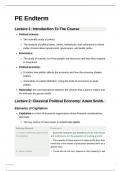Summary
Summary Political Economy (PE) Endterm Notes
- Course
- Institution
This document compiles the information provided during the lectures and the mandatory readings in a comprehensive document that has everything needed to ace the exam.
[Show more]



